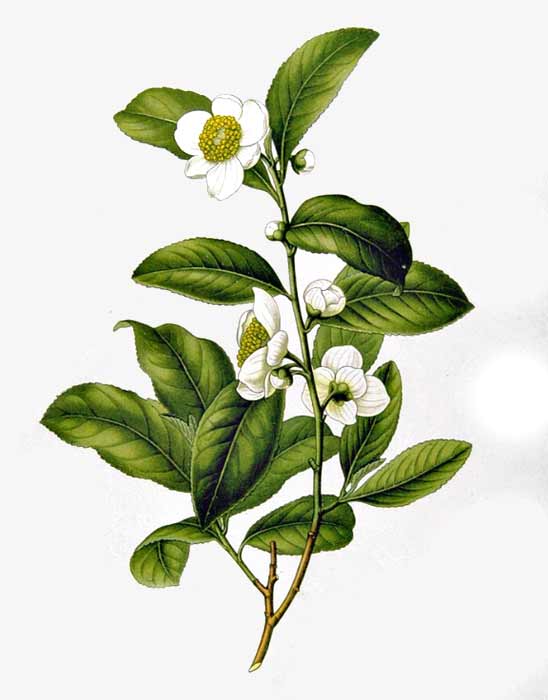Tea in herbal medicine and home remedies
Tea (camellia sinensis) helps combat fatigue, clear the mind, and protect against toxins. All types of camellia sinensis teas, including iced-tea, English breakfast tea, and green tea are beneficial to the digestion and to the nervous system.

Tea stabilizes blood lipids, lowers blood pressure, removes toxins, and fights other diseases including hardening of the arteries.
Tea is refreshing and healing.
The camellia sinensis shrub produces leaves and buds that are harvested for making various teas. There are many varieties on the market including white tea, green tea, English breakfast tea, oolong tea, and black tea.
Some are fermented, some are not. Some teas are highly processed and others like white tea are more natural.
Teas that are not made from the camellia sinensis shrub are usually referred to as "herbal teas" while "regular" tea is known as hot tea, breakfast tea, iced tea, and green tea.
The science of healing with tea
Modern medicinal research confirms that drinking tea promotes good health. Tests show that tea has strong anti-cancer properties.
Drinking tea is also proven to help prevent heart disease.
Tea is also anti-aging and anti-diabetic.
Tea contains strong catechins and theaflavins that work to keep us healthy.
Tea types
Tea types are based on the stage of the leaf when harvested and how the leaves and buds are processed.
- Black tea is fermented.
- Green tea is not fermented.
- Oolong tea is semi-fermented.
Many different fermenting and drying processes are used.
Green tea is younger leaves that are withered, steamed or pan fired.
Black tea is allowed to ferment a few hours before being smoked, flame fired, or steamed.
Oolong tea is partially oxidized before being processed like black tea.
Tea and skin cancer
Studies show that regular consumption of tea protects against squamous cell carcinoma of the skin. The benefits are even greater when lemon peel or citrus is added to the tea!
Studies also show that tea protects against prostate cancer, lung cancer, esophageal cancer, colon cancer, and liver cancer.
Tea protects our bodies
Tea is also shown to improve metabolic and cardiovascular health. This is good news for our endocrine systems!
Studies also show that tea is good for people suffering from arthritis.

Green tea is produced from young, fresh leaves.
To make green tea, the leaves and buds are cooked and then dried.
Green tea is rich in natural fluoride. It boosts immunity, reduces tooth decay, fights bacterial infections, stimulates digestion, increases urine flow, and contains 200 times more antioxidants than vitamin E.
Green tea is healing.
It is known to fight skin, lung, esophageal, and stomach cancers.
Green tea contains higher levels of flavonoids and vitamins than the other types of camellia sinensis teas. Green tea is recommended for asthma and coughs due to colds.
It is also useful when fasting and when dieting.
Studies show that regular consumption of green tea promotes clear thinking!
All kinds of tea
Camellia sinensis, used for thousands of years, is popular around the world.
Black, oolong, and green teas come from the same species of evergreen shrub. The kind of tea that is produced depends on the manner in which the leaves are processed.
Southern iced tea is usually of the black variety. All types of camellia sinenisis tea are useful in the treatment of asthma, fatigue, insect bites, high cholesterol, high blood pressure, diarrhea, food poisoning, hangovers, sore throats, and certain cancers.
Oolong tea in herbal medicine
Oolong tea is produced from fresh leaves that are wilted in the sunlight, slightly bruised, and partly fermented. Oolong tea helps reduce cholesterol levels and should be consumed immediately after fatty meals for best results.
Black tea is fully fermented.
Rich in antioxidants and tannins, black tea is highly astringent. It is a good remedy for diarrhea and can stop bleeding when applied to a wound.
Use a cool tea bag and press gently for thirty minutes or until bleeding stops. Dentists often recommend an application of wet tea bag after tooth extraction to stop bleeding.
Green tea really is a super food.
Watch this video about green tea filmed in China with Herbal Jedi.
Both green and black teas contain live enzymes that help the body excrete toxins.
Tea contains polyphenols and other anti-aging properties.
Tea is a great addition to the diet especially after a long illness, or anytime the body needs to be cleansed.
Tea is available under many brand names and types.
- Brancha Leaf Green tea is highly therapeutic.
- Kukicha Twig tea contains less caffeine and has a roasted mellow flavor.
- Darjeeling tea is a delicate black tea from India.
- Earl Grey tea is black tea sprayed with bergamot oil.
- English breakfast tea is a rich, mellow, black tea.
- Ceylon tea has an intense flowery aroma and flavor.
- White tea is basically the same as green tea but with even less processing.

Tea is native to the tropics and grows from sea level up to 8000 feet.
Leaves can be harvested every 6-14 days depending on the area and climate.
A tea plant will yield for 25-50 years.
*All types of camellia sinensis tea contain caffeine. Do not drink large amounts when pregnant and avoid if you have ulcers or irregular heartbeat. Always consult with a healthcare professional before using any herbal remedy especially if pregnant, nursing, or taking other medicines.
Sources:
https://www.ncbi.nlm.nih.gov/pmc/articles/PMC4055352/
Blessings to you and yours!
Thanks so much for reading my blog. Jan.

*Note - the information on this website has not been evaluated by the Food and Drug Administration.
© 2005-2024 website design and content by Janice Boling